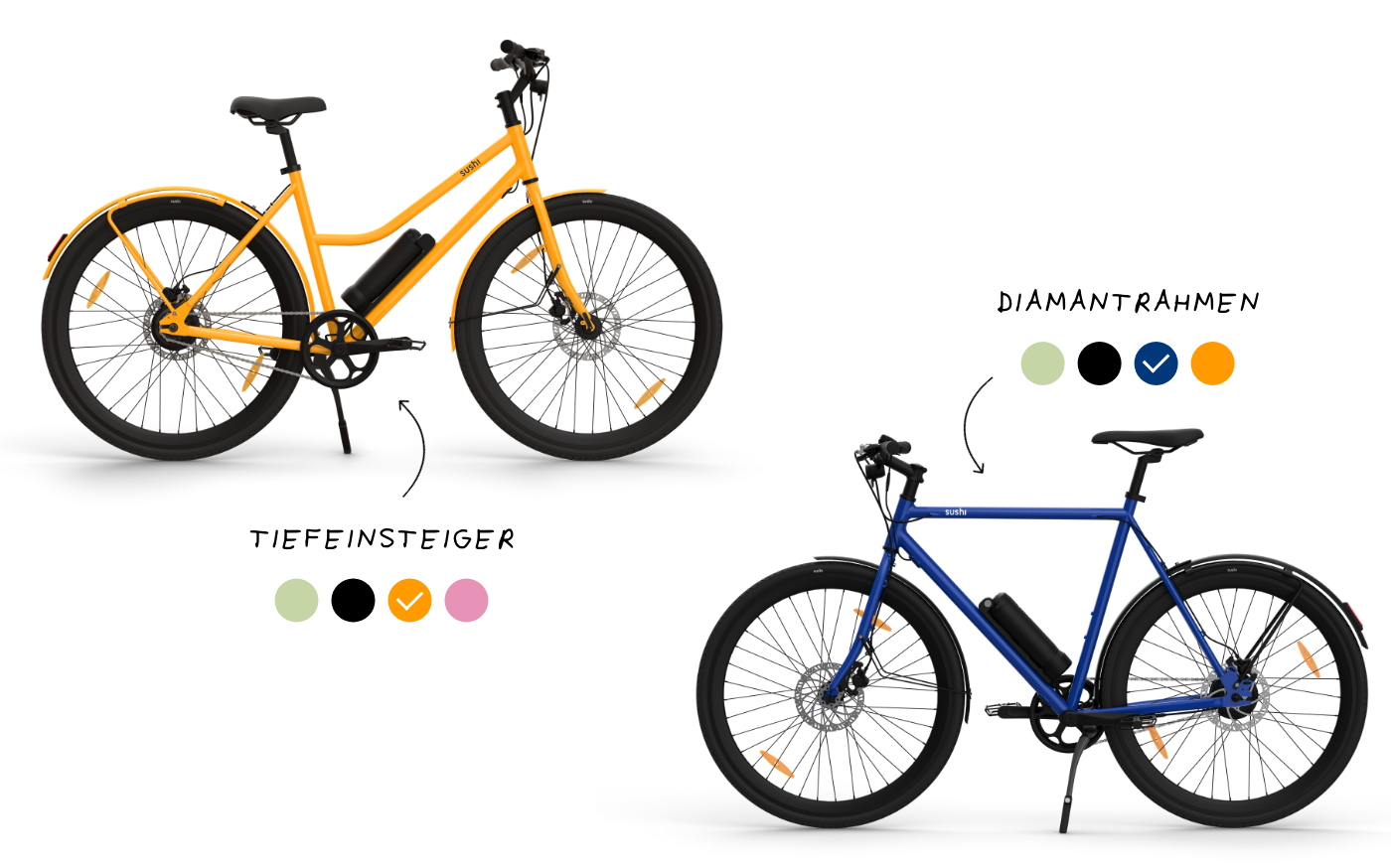Could you imagine what your everyday life would look like if you made it more sustainable? At SUSHI BIKES, sustainability plays a very important role. Our mission is to get more and more people to use e-bikes instead of cars and thus make an important contribution to green mobility .
But of course you can make your everyday life even greener and more conscious. Every step, no matter how small, counts! That's why today we're showing you a few helpful tips on how you can make a lasting difference by shopping and living consciously. Let's make the world a little bit better together!
1. What is sustainable in everyday life?
Sustainability in everyday life refers to the conscious decision to conserve resources and reduce environmental pollution. It includes measures such as recycling, saving energy, sustainable mobility and the conscious consumption of regional and seasonal products. By using reusable materials and reducing single-use plastic, everyone can make a contribution to sustainability. The conscious use of water and electricity and the reduction of waste are also important aspects of sustainable everyday life. The environment can be protected by using environmentally friendly cleaning products and avoiding excessive packaging waste. In addition, a sustainable diet plays a crucial role by using organic and fairly traded products. Sustainability in everyday life means acting responsibly and considering the impact of your own actions on the environment.
2. Less is more: Buy clothes consciously
Do you want to make your everyday life more sustainable but don't know where to start? A simple example is your shopping habits. Shop more consciously, look for sustainable products and share resources by choosing carefully. You can make a big difference, especially with clothing. Buy fewer, higher quality and more durable items. This way you not only live more sustainably, but also more consciously.
Avoid impulse purchases and share larger quantities with others to reduce waste. Keyword Capsule Wardrobe: Capsule Wardrobe means that your wardrobe consists of a few high-quality basic items of clothing that can all be perfectly combined with each other. A well-thought-out capsule wardrobe stands for a minimalist lifestyle and consciously avoiding a large number of items of clothing that are rarely worn.
3. Sustainability refrigerator : tips for grocery shopping
Acting sustainably in everyday life starts with grocery shopping. Pay attention to what you buy and how it was produced. Choose sustainable products that conserve resources and are environmentally friendly. If you are not a vegetarian, you may be able to make your meat consumption even more conscious. In fact, meat and dairy farming is responsible for almost 70 percent of all agricultural greenhouse gas emissions and more than 5 percent of total emissions in Germany.* So it's really worth replacing one or two dishes with vegetables or meat alternatives or looking for a milk alternative that you might also like. 😊
Also, make your shopping as simple as possible and plan ahead to avoid unnecessary trips and packaging waste. Look for regional and seasonal foods to shorten transport routes and reduce environmental impact.
In case you have bought too much food and cannot keep up with using it, freeze it (e.g. fruit or bread) or give it to neighbors or friends.
4. Reducing plastic waste
Reducing plastic waste is an important step towards a more sustainable lifestyle. In everyday life, you can easily use less plastic by, for example, using reusable shopping bags and avoiding single-use plastic. When shopping for groceries, you can make sure to buy products in recyclable packaging or choose loose goods. This does not always have to mean the expensive groceries from Weekly market. There are often many alternative unpackaged foods , such as vegetables and fruit , in your local discount store 😉
5. Saving energy made easy
Saving energy is not only good for the environment, but also for your wallet. For example, you can look for energy-efficient appliances when shopping or switch your lighting to LED. Consciously switching off electrical appliances in standby mode also helps to conserve resources. Make your life more sustainable by reducing water consumption and using less hot water. When you shampoo your hair or brush your teeth, the ( warm ) water doesn't necessarily have to be running, right? Remember: it's the little things!
6. Upcycling and second-hand shopping
Do you want to make your everyday life more sustainable? One easy way is upcycling and second-hand shopping. Instead of always buying new clothes, you can buy used items and save resources. This is especially easy if you already know exactly which item you want.
Tip: If there is a particular item of clothing that is at the top of your wish list, always check first whether it is available second-hand. This is usually the case and you will not only save money, but also conserve resources such as water and energy.
Upcycling also offers creative ways to create something new from old materials. For example, an old pair of jeans can be turned into a trendy bag or a unique decorative element for your home.
7. Conclusion: Small steps towards a more sustainable lifestyle
Implementing sustainability in everyday life does not require radical changes. Even small adjustments can have a noticeable, positive impact on the environment. By shopping more consciously and sharing resources, you make your everyday life more sustainable. For example, when buying clothes, you should look for sustainable materials and buy fewer, higher quality items. By using water consciously and reducing plastic waste, you are actively contributing to environmental protection. Tips such as saving energy in the home or upcycling old items show that sustainability is easy to implement in everyday life. A sustainable lifestyle does not mean doing without, but making conscious decisions that protect the environment in the long term. With small steps, you too can contribute to a more sustainable future.
*Source: AOK Magazine 2023



